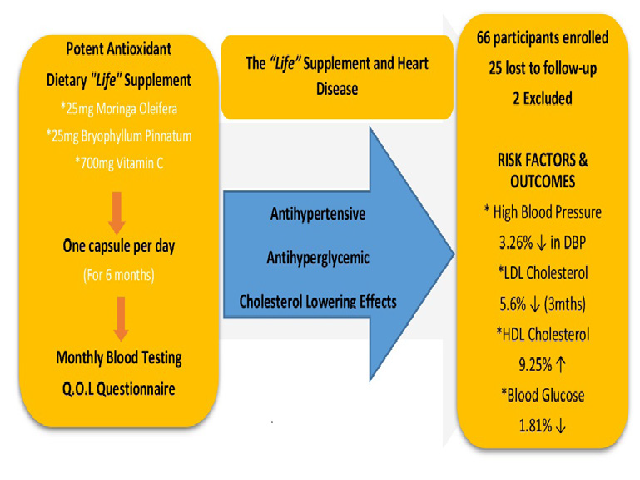Preliminary Outcomes on the Use of an Antioxidant Dietary Supplement for Patients with or at Risk of Heart Disease
DOI:
https://doi.org/10.5530/fra.2017.2.22Keywords:
Heart Disease, Bryophyllum pinnatum, Moringa oleifera, Diabetes, Cholesterol, HypertensionAbstract
Aims: To report initial feasibility outcomes from a pilot study on the use of a potent antioxidant dietary supplement on several parameters in persons with or at risk of heart disease. Statistical analysis used:In this uncontrolled longitudinal pilot study, sixty-six participants received a dietary supplement consisting of Moringa oleifera, Bryophyllum pinnatum and vitamin C. Participants were instructed to consume one capsule daily for a period of six months. Once a month, blood work and a quality of life questionnaire were completed and the data recorded. Feasibility was based on the researcher’s observations and collected data. Statistical analysis used: Due to the nature of the study no statistical packages were used. Excel spreadsheets and measures of location were used to analyze the data. Results: Recruitment and retention data was indicative of feasibility. With 37.9% of the registered participants being lost to follow-up. A 3.26% change in diastolic blood pressure was noted among female participants one month after their initial blood pressure was recorded. Blood glucose levels decreased among participants by 1.81% after three months of supplement use. High Density Lipoprotein (HDL) cholesterol levels increased for both groups, with the males experiencing a 9.25% increase in their HDL levels. On the other hand, Low Density Lipoprotein cholesterol levels among female participants decreased by 5.6%. Conclusions: The pilot data is supportive of the implementation of a randomized, long-term evidence-based intervention.
Downloads
Metrics





